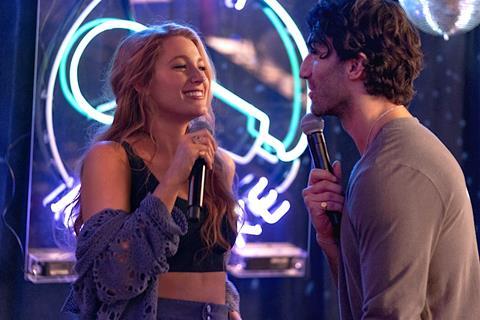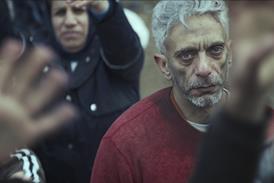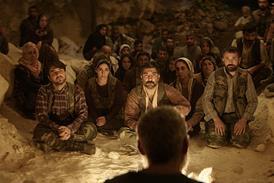Blake Lively stars alongside director Justin Baldoni in this incisive adaptation of Coleen Hoover’s bestseller

Dir: Justin Baldoni. US. 2024. 130mins
What begins as a steamy rom-com becomes a cautionary tale in director/star Justin Baldoni’s adaptation of Colleen Hoover’s best-selling novel It Ends With Us. Lily Bloom (Blake Lively) meets cute with the too-good-to-be-true neurosurgeon Ryle Kincaid (Baldoni) atop a Boston area rooftop. They begin an outwardly perfect romance that’s upset when an old flame from Lily’s past re-enters the picture, rupturing the couple’s tranquility to reveal a grave reality. This is a film that leans into its cliches – long, loving nights transform into windswept mornings, ardent dialogue teases obsession – and smartly uses them to enact triggering lessons about generational trauma.
Absorbing and refreshingly frank
Following Five Feet Apart and Clouds, Baldoni – who gained fame on TV’s Jane The Virgin – is extending his reach here. Released in US and UK theaters on August 9 and led by Lively (well-known to rom-com fans thanks to The Age Of Adaline), It Ends With Us brings with it a legion of fans of Hoover’s novel, and could also attract the kind of older adult audience who fell for Ticket To Paradise. It should also have a healthy post-theatrical life on VoD.
In its telling opening scene, Lily is driving to her sleepy hometown of Plethora, Maine. Her father has recently passed away, and she’s back for the funeral. Despite the loss, however, Lily appears stern and detached. She doesn’t write a eulogy, and struggles to even say one good thing about her dad before absconding from the funeral back to Boston. As she is smoking atop a rooftop, forlornly overlooking the city, Ryle crashes through a door. He lost a six-year-old boy during surgery, and is broken up enough about it to kick a chair – but not enough to ignore Lily. He isn’t one of those commitment guys, and Lily isn’t a one-night-stand kind of girl. They leave their instant spark for another day.
The film is deliberate in its set-up. There are flashbacks to a younger Lily (Isabela Ferrer) befriending Atlas (Alex Neustaedter), an unhoused teen living in an abandoned building next door to Lily’s lavish home. We watch their young romance develop in the shadows of Lily’s abusive father, who often attacked her mother Jenny (Amy Morton). Those scenes are jabbed in by editors Oona Flaherty and Robb Sullivan, amongst the present-day sequences of Lily opening her dream flower shop, hiring Allysa (Jenny Slate) as a cashier, and falling in love with her brother – who, surprise, surprise, happens to be Ryle.
Absurd coincidences like that are the bread-and-butter of the rom-com. As are the allegorical intentions behind Lily and Ryle’s names and the fairy-tale development of their relationship, captured here by screenwriter Christy Hall. Sometimes the film stretches belief: Where did Lily get the money to start her flower shop? Why is it we never see Ryle’s co-workers? Why does Ryle live with his sister and her husband Marshall (Hasan Minhaj)? On the other hand, sometimes the contrivances work well, such as Lily and Ryle meeting Lyle’s mom at a hip new restaurant called Root that just happens to be owned by an adult Atlas (Brandon Sklenar, coming across like a mix of Chris Evans and Bill Pullman).
Unlike other romances, It Ends With Us moves at a measured pace. By using the flashbacks as CliffsNotes for the audience, Baldoni and his editors appear self-conscious about being able to connect Lily’s past experiences with abuse to her present relationship. The elongated runtime, however, does serve another purpose, aptly depicting spousal abuse more naturalistically. While most movies would quickly ramp up to such violence, this film shows how seemingly accidental moments of aggression can slowly build into a pattern and increase in intensity before the victim realises what’s happening.
The steady ramping up works because Baldoni and his DoP Barry Peterson trust their actors. Lily and Ryle are shot in close-up for their early flirtation scenes, increasing the sensual mood. For the later foreboding confrontations between Lily and Ryle – when Ryle becomes fiercely jealous of Atlas – Baldoni and Peterson increase the tension by allowing the scenes to run longer. Baldoni’s Ryle can be exceptionally terrifying to watch simply because he appears to be a normal guy. Lively, on the other hand, knows how much power is contained in a tear. Whenever Lily cries, whether it’s her pleas for Ryle not to leave her or for him not to overreact, you can never tell if her emotions arise from fear, hurt or trauma. Often Lively is playing with all three feelings at once, adding greater depth to a character who is designed as a cipher for trauma.
The acting offers a kind of subtlety the rest of the film does not. The jukebox soundtrack, which grabs hits like Birdie’s cover of Bon Iver’s ‘Skinny Love’, Taylor Swift’s ‘My Tears Ricochet’ and Fatboy Slim’s ‘Praise You’ tells you exactly how to feel. The clunky on-the-nose dialogue takes a similar direct path, as does the film’s confusing logic. And yet, this triggering romance is absorbing and refreshingly frank about how love doesn’t mean a relationship isn’t toxic or, even worse, dangerous.
Production companies: Wayfarer Studios, Sony Pictures Television, Saks Picture Company
Worldwide Distributor: Sony Pictures Releasing
Producers: Alex Saks, Jamey Heath, Blake Lively, Christy Hall
Screenplay: Christy Hall
Cinematography: Barry Peterson
Production design: Russell Barnes
Editing: Oona Flaherty, Robb Sullivan
Music: Duncan Blickenstaff, Rob Simonsen
Main cast: Blake Lively, Justin Baldoni, Jenny Slate, Hasan Minhaj, Amy Morton, Brandon Sklenar
























